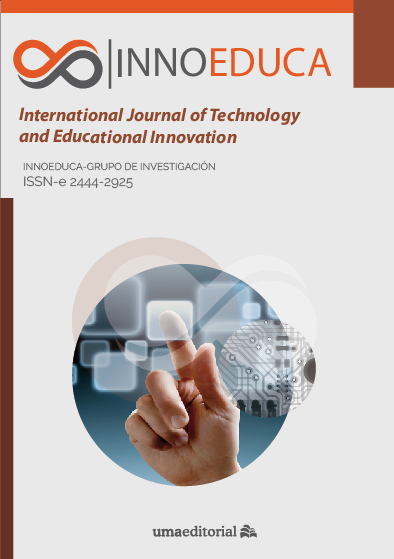Predicción de la satisfacción del alumnado con la educación virtual a partir de las conductas de estilo de vida orientadas a la salud
Contenido principal del artículo
Resumen
El objetivo de este estudio fue evaluar la satisfacción del alumnado con la educación virtual a partir de sus conductas de estilo de vida orientadas a la salud. La presente investigación fue un estudio descriptivo correlacional. La población estadística incluyó a todos los estudiantes de grado en ingeniería y psicología en la Universidad Islámica de Azad, rama Shahre Rey en el segundo semestre de 2020-2021, de los cuales 188 conformaron la muestra (93 estudiantes de ingeniería y 95 de psicología), que fue seleccionada al azar. Para recopilar los datos se utilizó un instrumento para medir la satisfacción con la educación virtual, además de una escala para las conductas de estilo de vida académico orientadas a la salud (Salehzadeh et al., 2017). Los hallazgos indicaron que los componentes del estilo de vida orientado a la salud en conjunto explican el 37.4% de la varianza de la satisfacción del alumnado con la educación virtual. La relación entre los facilitadores del estilo de vida centrado en la salud (optimismo académico, orientación a metas y resiliencia académica) con la satisfacción de los estudiantes respecto a la educación virtual fue positiva y significativa. La relación entre los componentes inhibidores del estilo de vida centrado en la salud (impotencia aprendida y procrastinación) con la satisfacción del alumnado con la educación virtual fue negativa y significativa. La relación entre el componente de retirada de esfuerzo y la satisfacción de los estudiantes con la educación virtual no fue significativa (p > 0.05) y no hubo diferencia entre los componentes del estilo de vida orientado a la salud y la satisfacción del alumnado con la educación virtual en función de grupos educativos. Como consecuencia, al crear un entorno educativo resiliente con la intención de participar y enseñar para lograr un aprendizaje significativo y basado en problemas, el alumnado apostará por la educación virtual.
Palabras clave:
Detalles del artículo
Referencias
Bawaneh, A. K. (2020). The satisfaction level of undergraduate science students towards using E-learning and virtual classes in exceptional condition covid-19 crisis. Turkish Online Journal of Distance Education. 22(1), 52-56. https://doi.org/10.17718/tojde.849882 DOI: https://doi.org/10.17718/tojde.849882
Brodsky, M. W. (2020). E-learning Implementation. https://bit.ly/3ryk6Gc
Cao, W., Fang, Z., Hou, G., Han, M., Xu, X., Dong, J., & Zheng, J. (2020). The psychological impact of the COVID-19 epidemic on college students in China. Psychiatry Res, 287, 112934. https:// doi. org/ 10. 1016/j. psych res. 2020. 112934. DOI: https://doi.org/10.1016/j.psychres.2020.112934
Chirag Buch, A., Rathod, H., & Kamble, R. (2020). E-learning: The Scenario During COVID-19 Pandemic. Journal of Medical Education, 19(2), e107227. https://doi.org/10.5812/jme.107227 DOI: https://doi.org/10.5812/jme.107227
Chitra, A. P., & Raj, M. A. (2018). E-Learning. Journal of Applied and Advanced Research, 3, 11-13. https://doi.org/10.21839/jaar.2018.v3iS1.158 DOI: https://doi.org/10.21839/jaar.2018.v3iS1.158
Cabrera, N., & Padilla A. (2013). Entering and succeeding in the culture of college. J of Behav Sci. 26(2), 152-157. https://doi.org/10.1177/0739986303262604 DOI: https://doi.org/10.1177/0739986303262604
Dweck, C. S., & Leggett, E. L. (1988). A social-cognitive approach to motivation and personality. Psychological Review, 95, 256–273. https://doi.org/10.1037/0033-295x.95.2.256 DOI: https://doi.org/10.1037/0033-295X.95.2.256
Elliot, A.J. (1999). Approach and Avoidance Motivation and Achievement Goals. Educational Psychologist, 34(3), 169-189. https://doi.org/10.1207/s15326985ep3403_3 DOI: https://doi.org/10.1207/s15326985ep3403_3
Elliot, A. J., & Dweck, C. S. (2005). A conceptual history of the achievement goal construct. In A. J. Elliot & C. S. Dweck (Eds.), Handbook of competence and motivation (pp. 52–72). Guilford Press.
Fathievajargah, F., Pardakhtchi, M., & Rabiei, M. (2011). Evaluating the effectiveness of virtual education courses in the Iranian higher education system (Case study: Ferdowsi University of Mashhad). Quarterly Journal of Information and Communication Technology in Educational Sciences. 4, 5-21
Ferrari, J. R. (2000). Procrastination and attention: Factor analysis of attention deficit, boredomness, intelligence, self-esteem, and task delay frequencies. Journal of Social Behavior and Personality, 15, 185–196.
Garson, G. D. (2007). Testing of assumptions. https://bit.ly/3IgfOsR
Gholipour, D., Mohammadi, A., Zolfaghari, M., Imani, S., & Tahmasebian, S. (2020). The Relationship of Satisfaction and Usage of Virtual Learning Facilities with Learning Style in Medical, Health, and Operating Room Students. Strides in Development of Medical Education, 17(1), e88967. https://doi.org/10.22062/sdme.2020.91007
Giusti, L., Mammarella, S., Salza, A., Del Vecchio, S., Ussorio, D., Casacchia, M., & Roncone, R. (2021). Predictors of academic performance during the covid-19 outbreak: impact of distance education on mental health, social cognition and memory abilities in an Italian university student sample. BMC Psychol, 9, 142. https://doi.org/10.1186/s40359-021-00649-9 DOI: https://doi.org/10.1186/s40359-021-00649-9
Gunasinghe, J., Hamid, A., Khatibi, A., & Ferdous, S.M. (2019). Academicians' Acceptance of Online Learning Environments: A Review of Information System Theories and Models. Global Journal Of Computer Science And Technology, 19(1), 31-39. https://bit.ly/3DeRJid DOI: https://doi.org/10.34257/GJCSTHVOL19IS1PG31
Gürol, M., & Kerimgil, S. (2010). Academic optimism. Procedia Social and Behavioral Sciences, 9, 929–932. https://doi.org/10.1016/j.sbspro.2010.12.261 DOI: https://doi.org/10.1016/j.sbspro.2010.12.261
Hall, M. (2001). Realizing the Virtual Hamburge. https://bit.ly/3xMMe9z
Harackiewicz, J. M., Durik, A. M., Barron, K. E., Linnenbrink-Garcia, L., & Tauer, J. M. (2008). The role of achievement goals in the development of interest: Reciprocal relations between achievement goals, interest, and performance. Journal of Educational Psychology, 100, 105–122. https://doi.org/10.1037/0022-0663.100.1.105 DOI: https://doi.org/10.1037/0022-0663.100.1.105
Heng, K., & Sol, K. (2020, December 08). Online learning during COVID-19: Key challenges and suggestions to enhance effectiveness. Cambodian Education Forum. https://bit.ly/3xM1rrq
Horesh, D., & Brown, A.D. (2020). Traumatic stress in the age of COVID-19: a call to close critical gaps and adapt to new realities. Psychol Trauma. 12(4), 331–5. https://doi.org/10.1037/tra0000592. DOI: https://doi.org/10.1037/tra0000592
Hoy, W., Tarter, C., & Woolfolk, A. (2006). Academic Optimism of Schools: A Force for Student Achievement. American Educational Research Journal, 43(3), 425–446. https://doi.org/10.3102/00028312043003425 DOI: https://doi.org/10.3102/00028312043003425
Jamalallail, M. (2014, June 22-25). Future anxiety and optimism among gifted student’s parents [Conference presentation]. International Academic Conference Proceedings, Budapest, Hungary. https://www.westeastinstitute.com/wp-content/uploads/2014/07/Mohammad-Jamalallail.pdf
Jarvis, S., & Seifert, T. (2002). Work Avoidance as a Manifestation of Hostility, Helplessness, and Boredom. The Alberta Journal of Educational Research, 48(2), 174-187.
Khademi, M., & Kadkhodaei, F. (1995). The effect of learned optimism on achievement motivation and academic resilience of female adolescents. Journal of Positive Psychology, 2, 65-80.
Klassen, R. M., Krawchuk, L. L., & Rajani, S. (2008). Academic procrastination of undergraduates: Low self-efficacy to self-regulate predicts higher levels of procrastination. Contemporary educational psychology, 33, 915-931. https://doi.org/10.1016/j.cedpsych.2007.07.001 DOI: https://doi.org/10.1016/j.cedpsych.2007.07.001
Kline, R. (2005). Principiples and Practices of structural equation modeling. Guilford.
Lee, B. C., Yoon J. O., & Lee, I. (2009). Learners’ Acceptance of e-Learning in South Korea: Theories and Results. Computers & Education, 53, 1320-1329. https://doi.org/10.1016/j.compedu.2009.06.014 DOI: https://doi.org/10.1016/j.compedu.2009.06.014
Maier, S.F., & Seligman, M.E.P. (1976). Learned helplessness: Theory and evidence. Journal of Experimental Psychology: General, 105(1), 3-46. https://doi.org/10.1037/0096-3445.105.1.3 DOI: https://doi.org/10.1037/0096-3445.105.1.3
MacIntyre, P. D., Gregersen, T., & Mercer, S. (2020). Language teachers’ coping strategies during the Covid-19 conversion to online teaching: Correlations with stress, wellbeing and negative emotions. System, 94(11), e102352. https://doi.org/10.1016/j.system.2020.102352 DOI: https://doi.org/10.1016/j.system.2020.102352
Mahyoob, M. (2020). Challenges of e-Learning during the COVID-19 Pandemic Experienced by EFL Learners. Arab World English Journal, 11(4) 351-362. https://dx.doi.org/10.24093/awej/vol11no4.23 DOI: https://doi.org/10.24093/awej/vol11no4.23
Meichenbaum, D. (2005). Understanding resilience in children and adults: Implications for prevention and interventions. http://www.coping.us/images/Understand_Resilience_of_Children_Adults.pdf
Meyers, L. S, Gamest.G., & Goarin, A. J. (2006). Applied multivariate research, design and interpretation. Thousand oaks.
Moore, J. L., Dickson, C., & Galyen, K. (2011). e-Learning, online learning, and distance learning environments: Are they the same? The Internet and Higher Education, 14(2), 129-135. https://doi.org/10.1016/j.iheduc.2010.10.001 DOI: https://doi.org/10.1016/j.iheduc.2010.10.001
Nicholas, A. J., & Levy, Y. (2009). Empirical assessment of college students–athlete’s president in e-learning courses: a case of study of a U.S. National Association of Intercollegiate Athletics. Turkish online journal of distance education (TOJDE). 12(1), 14-25. https://doi.org/10.1016/j.iheduc.2008.10.003 DOI: https://doi.org/10.1016/j.iheduc.2008.10.003
O’Connor, R. C., & Cassidy, C. (2007). Predicting hopelessness: The interaction between optimism/pessimism and specific future expectancies. Cognition & Emotion, 21, 596–613. https://doi.org/10.1080/02699930600813422 DOI: https://doi.org/10.1080/02699930600813422
Oraif, I., & Elyas, T. (2021). The Impact of COVID-19 on Learning: Investigating EFL Learners’ Engagement in Online Courses in Saudi Arabia. Education Sciences, 11(3), e99. https://doi.org/10.3390/educsci11030099 DOI: https://doi.org/10.3390/educsci11030099
Qiu, J.Y., Shen, B., Zhao, M., Wang, Z., Xie, B., & Xu, Y.F. (2020). A nationwide survey of psychological distress among Chinese people in the COVID-19 epidemic: implications and policy recommendations. Gen Psychiat., 33, e100213. https://doi.org/10.1136/gpsych-2020-100213 DOI: https://doi.org/10.1136/gpsych-2020-100213
Romiszowski, A.J. (2004). How’s the E-learning Baby? Factors Leading to Success or Failure of an Educational Technology Innovation. Educational Technology, 44(1), 5-27.
Sahu P. (2020). Closure of universities due to coronavirus disease 2019 (COVID-19): impact on education and mental health of students and academic staff. Cureus, 12(4), e7541. https://doi.org/10.7759/cureus.7541. DOI: https://doi.org/10.7759/cureus.7541
Salehzadeh, P., Shokri, A., & Fathabadi, J. (2017). Health-centered academic lifestyle, an emerging idea in academic health psychology. Quarterly Journal of Educational Psychology, 1, 30-46.
Sarkar, M. R. (2004). Policy of Education for the 21st Century in Developed and Developing Countries: Focus on Japan and Persian Gulf Region. Journal of International Cooperation Studies. 11(3),101-130.
Schroeder, C. (2003). New Students, New Learning Styles. https://bit.ly/3G9UqDB
Shahbeigi, F., & Nazari, S. (2012). Virtual Learning: Benefits and Limitations. Journal of Yazd Center for the Study and Development of Medical Education, ,(1)647-54.
Soufi, S., Fathabadi, J., & Ghanbari, S. (2017). Causal structure of antecedents and consequences of health-oriented academic lifestyle in gifted female students. Quarterly Journal of Exceptional People Psychology., 35, 37-71. https://doi.org/10.22054/JPE.2020.46269.2049
Steinhardt, M. A., & Dolbier, C. L. (2008). Evaluation of a resilience intervention to enhance coping strategies and protective factors and decrease symptomatology. Journal of American College Health, 56(4), 445-453. https://doi.org/10.3200/JACH.56.44.445-454 DOI: https://doi.org/10.3200/JACH.56.44.445-454
Sun, P. C., Tsai, R. J., Finger, G., Chen, Y. Y., & Yeh, D. (2008). What Drives a Successful e-Learning? An Empirical Investigation of the Critical Factors Influencing Learner Satisfaction. Computers and Education, 50(4), 1183-1202. https://doi.org/10.1016/j.compedu.2006.11.007 DOI: https://doi.org/10.1016/j.compedu.2006.11.007
Tadesse, S., & Muluye, W. (2020). The Impact of COVID-19 Pandemic on Education System in Developing Countries: A Review. Open Journal of Social Sciences, 8, 159-170. https://doi.org/10.4236/jss.2020.810011 DOI: https://doi.org/10.4236/jss.2020.810011
Ungar, M., & Liebenberg, L. (2011). Assessing resilience across cultures using mixed methods: Construction of the child and youth resilience measure. Journal of Mixed Methods Research, 5(2), 126-149. https://doi.org/10.1177/1558689811400607 DOI: https://doi.org/10.1177/1558689811400607
Wang, C., Pan, R., Wan, X., Tan, Y., Xu, L., Ho, C.S., & Ho, R.C. (2020). Immediate psychological responses and associated factors during the initial stage of the 2019 coronavirus disease (COVID-19) epidemic among the general population in China. Int J Environ Res Public Health, 17(5), e1729. https://doi.org/10.3390/ijerph17051729 DOI: https://doi.org/10.3390/ijerph17051729
Weibel, D., Stricker, D., & Wissmath, B. (2012) The use of a virtual learning centre in the context of a university lecture: factors influencing satisfaction and performance. Interactive Learning Environments, 20(1), 77-87. https://doi.org/10.1080/10494821003755502 DOI: https://doi.org/10.1080/10494821003755502
Wolters, C. A. (2004). Advancing achievement goal theory: Using goal structures and goal orientations to predict students’ motivation, cognition, and achievement. Journal of Educational Psychology, 96, 236–250. https://doi.org/10.1037/0022-0663.96.2.236 DOI: https://doi.org/10.1037/0022-0663.96.2.236
Yaghoobi, A., & Bakhtyari, M. (2016). The effect of resilience training on burnout in high school female student. Q J Res Sch Virt Learn. 4(13), 7-16.
Yan, L., Gan, Y., Ding, X., Wu, J., & Duan, H. (2021). The relationship between perceived stress and emotional distress during the COVID-19 outbreak: Effects of boredom proneness and coping style. Journal of anxiety disorders, 77, e102328. https://doi.org/10.1016/j.janxdis.2020.102328 DOI: https://doi.org/10.1016/j.janxdis.2020.102328








